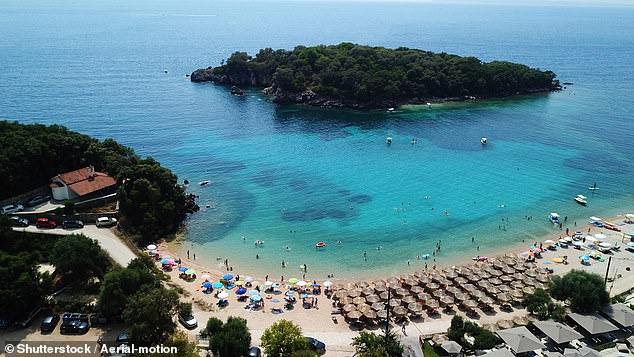A British tourist tragically died on his sun lounger while relaxing on a Greek paradise island beach.
The 73-year-old man was found by fellow beach-goers at the spot in Agia Paraskevi, Skiathos, on Friday.
They alerted a lifeguard who provided first aid and called the emergency services, according to local reports.
A doctor from a nearby health center tried for 40 minutes to revive the tourist but unfortunately was unable to do so.
The man’s cause of death is unknown, and an autopsy is being carried out.
A FCDO Spokesperson said: ‘We are supporting the family of a British man who has died in Greece and are in contact with the local authorities’.
It comes after last month, another British tourist was also found dead on a Greek beach.
The 68-year-old man was tragically found dead in Lindos, on the island of Rhodes on June 12.
Local media reported that he had apparently gone for a swim, and lost consciousness before passing away.
Officers from the Central Port Authority of Rhodes rushed to the scene following reports of his body being found.

A british tourist died on his sun lounger while relaxing on a Greek paradise island beach (stock image of Agia Paraskevi on Skiathos Island)

The 73-year-old man was found by sunseekers at the spot, in Agia Paraskevi, Skiathos, on Friday (stock image of Agia Paraskevi on Skiathos Island)
He was transferred to the island’s Archangelos Health Center where he was pronounced dead.
The tragedy came just days after two British tourists were found in separate incidents on the Algarve.
One man, said to be 21, was discovered shortly before 7am in the party resort of Albufeira on June 4.
The man, who was fully clothed and had all his belongings with him, according to police, was found at the bottom of the steps in an avenue called Avenida da Liberdade.
An autopsy has already taken place but the results have not been made public.
Portuguese police are understood to have ruled out any link to a crime and are said to be treating the death as a tragedy linked to excessive alcohol consumption.
It was not immediately clear today where the tourist, who is aged in his twenties, had been heading from and to and whether he was staying at a hotel in Albufeira.
No explanation has been given as to why he might have been naked, although police have not yet confirmed he had no clothes on.
His body was discovered just four hours before that of Scot Greg Monks, 38, from Glasgow, who disappeared in the same resort on a stag do last week.
He is thought to have jumped over a wall and fallen down a steep cliff after becoming disorientated as he tried to head back to his holiday hotel.
‘He’s [Mr Monks] another victim of the strip,’ one local hotel worker told MailOnline this week.
‘It encourages heavy drinking and drugs are too easily available, it’s easy to lose control.
‘Brits come on stag dos and buy drugs straight away, and have no idea what they are cut with, there are some really dangerous people here.’
There is no suggestion that Mr Monks had taken drugs on the night he disappeared.
The worker, who asked not to be named over fear of reprisals, said he believes he may have seen Mr Monks walking alone shortly before 2am on the night he vanished.
‘He seemed really intoxicated and was carrying a traffic sign,’ he recalled, ‘I was scared to approach him but now I feel really bad, because if it was him I could have helped.’
The local said he informed the Scot’s family of what he saw when he came across the missing person’s report.
Another hotel worker, Tadeu, told MailOnline: ‘I’m so tired of the tourists who come here, they behave like mental asylum escapees, it’s dangerous.
‘They walk around like they own the place and with an air of entitlement.’
He added: ‘I’ve decided to move to another city later this year, I just don’t feel very safe, it’s not a nice place to live at times.’
Tadeu’s hotel has tried to take matters into its own hands by creating a ‘behaviour booklet’ for its guests, which tells them how to be a ‘good’ visitor – including being properly dressed, respecting the area and not drinking to excess.
This article was originally published by a www.dailymail.co.uk . Read the Original article here. .

